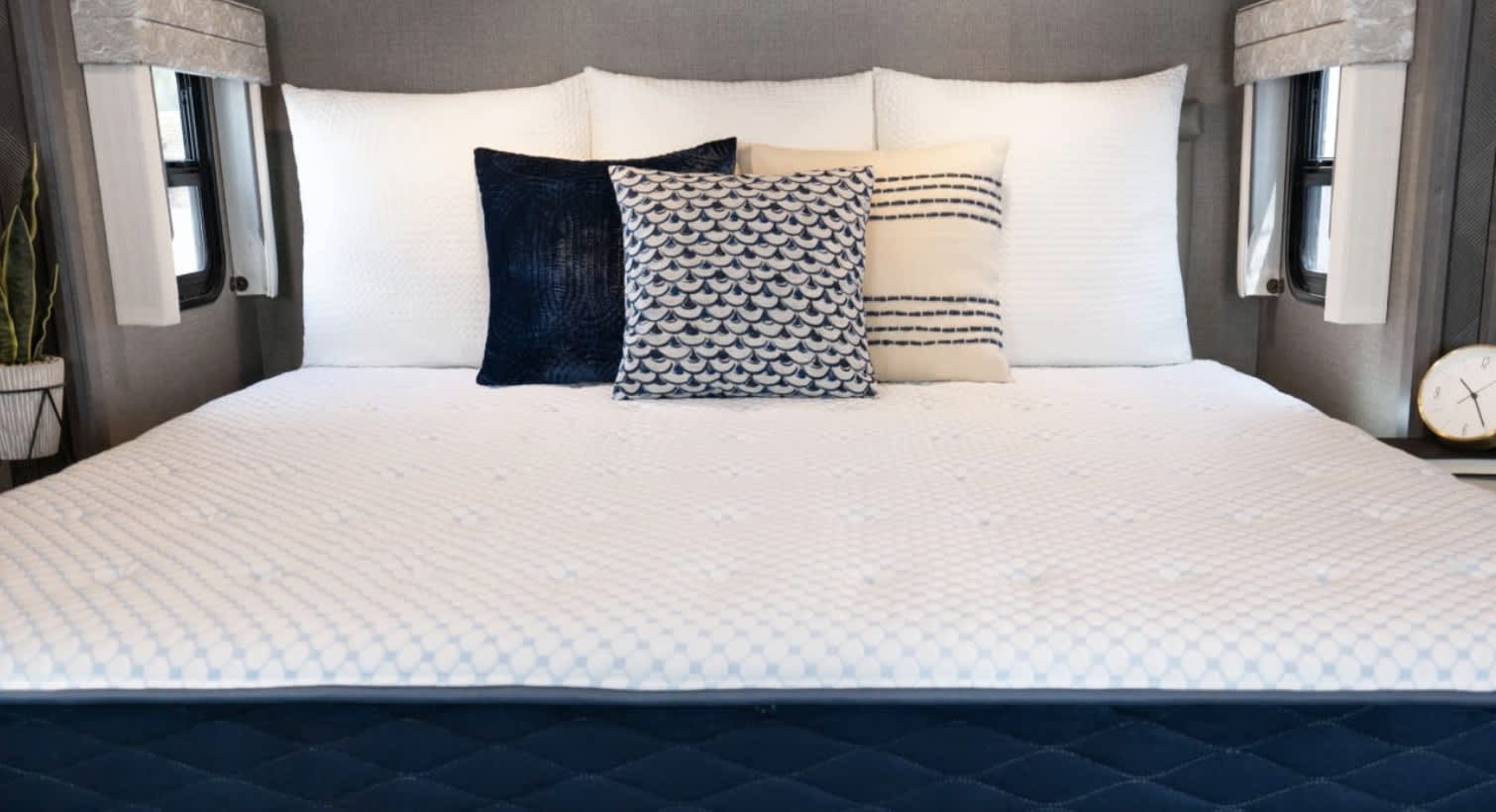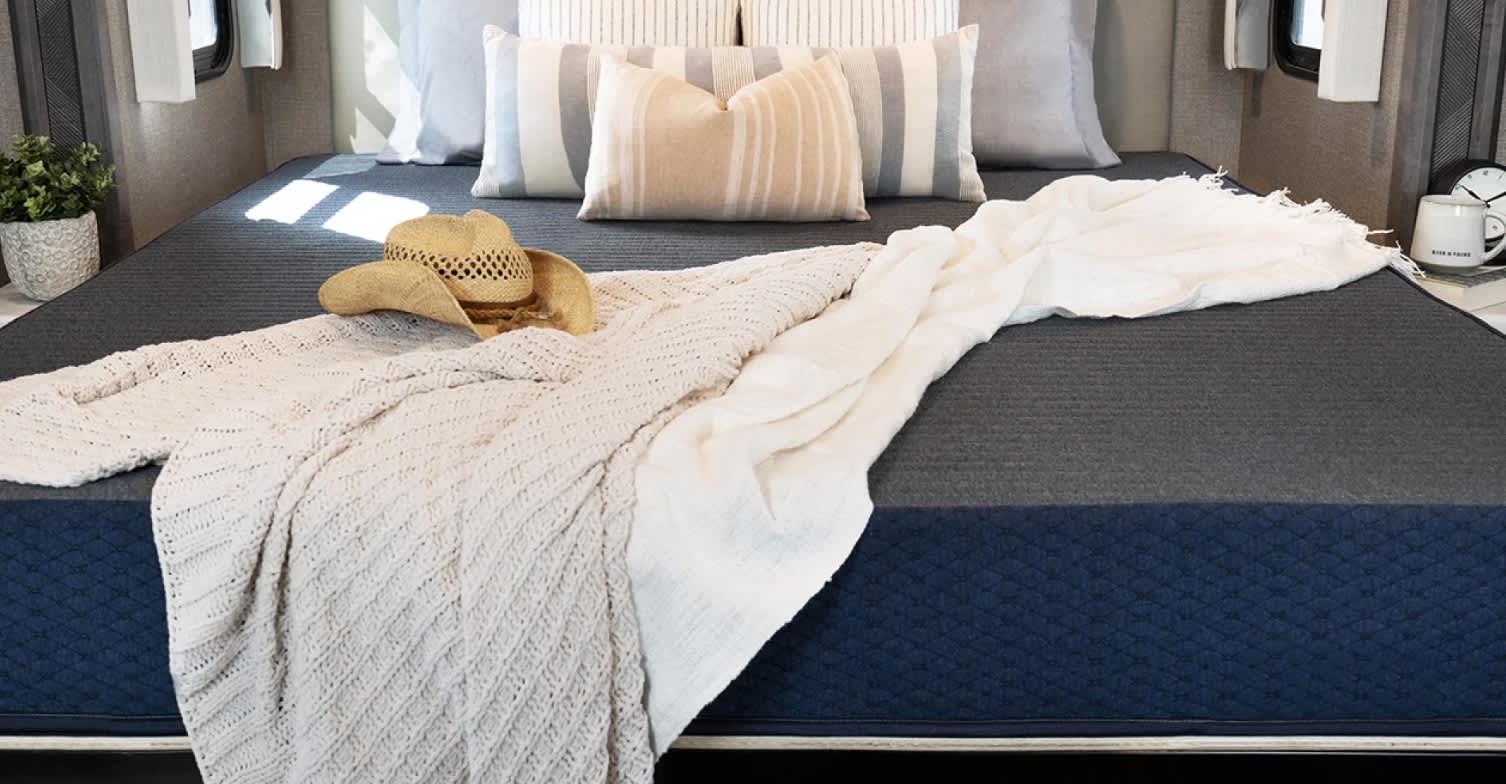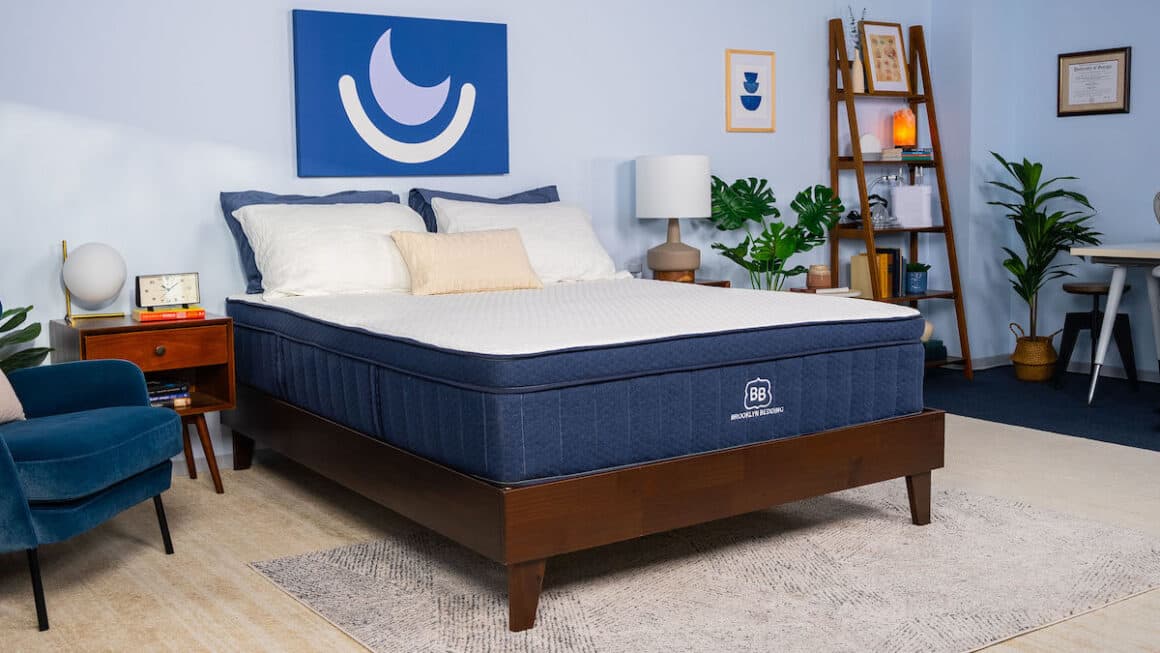On This Page
The Best RV Mattress of 2025
Our Top Picks
-
Best Mattress Overall
Brooklyn Bedding Signature Hybrid -
Most Comfortable Mattress
Helix Midnight -
Best Value Mattress
Dreamfoam Hybrid -
Best Foam Mattress
Dreamfoam Essential -
Best Mattress for Side Sleepers
PlushBeds MobilePlush Original RV Mattress -
Best Cooling Mattress
Brooklyn Bedding Aurora Luxe
Best Mattress Overall

Brooklyn Bedding’s Signature Hybrid is very versatile thanks to a wide range of firmness and size options, making it suitable for most RV owners no matter what kind of bed frame they use in their vehicle. A below-average price-point further adds to the appeal, as does the optional cooling pillow-top.
Pros & Cons
Pros
- High-quality hybrid design at an approachable price
- Available in three firmness levels and eight RV-friendly sizes
- Optional pillow-top layer adds plushness to the surface
Cons
- May feel overly responsive and create motion transfer for couples
- Firmness and size exchanges are not available during the trial period
- Initial off-gassing odor may be unpleasant
Ratings
Our Take
Most Comfortable Mattress
The Midnight uses the reliable combo of adaptive foam comfort layers and robust coils, creating a nice balance of cushioning, support, and bounce. It’s no wonder this has long been one of Helix Sleep’s most popular mattresses.
Pros & Cons
Pros
- Balanced medium firm design with adaptive foam layers and sturdy pocketed coils
- Reinforced perimeter pushes back against your weight to reduce sinkage along the edges
- Below-average pricing for a hybrid
Cons
- Mattress may sleep somewhat hot without the cooling cover upgrade
- Coils may produce motion transfer and disturb sleep for couples
- Foam layers emit a strong off-gassing smell for the first couple nights
Ratings
Our Take
Best Value Mattress

The Dreamfoam Hybrid is assembled with quality materials and affordably priced – a rare combo in today’s mattress market. You can choose from a wide range of RV sizes, and all beds come with a generous 4-month trial period.
Pros & Cons
Pros
- High-quality foam hybrid design at an approachable sticker price
- Comfy balance of cushioning, support, and pushback
- Wide selection of standard and RV-friendly sizes
Cons
- Too soft for most back and stomach sleepers over 230 pounds
- Limited edge support
Ratings
Our Take
Best Foam Mattress

The Dreamfoam Essential is an affordable — and more importantly, reliable — all-foam mattress option for your RV. A wide range of profiles, firmness levels, and sizes helps ensure you’ll be able to find at least one suitable option regardless of how your vehicle is configured.
Pros & Cons
Pros
- Wide firmness and profile selection
- Great motion isolation for couples
- Below-average pricing
Cons
- Weak edge support for most designs
- Strong initial off-gassing odor
Ratings
Our Take
Best Mattress for Side Sleepers

The MobilePlush RV Mattress from PlushBeds uses adaptive, open-cell foam that promotes even alignment and cushions your sore spots. Thanks to the slim profile and multiple size options, this all-foam model should meet the needs of a wide range of RV owners.
Pros & Cons
Pros
- Memory foam offers top-notch pressure relief, especially for a thin mattress
- Isolates motion well
- Comes in six sizes, including two designed for RVs
Cons
- Higher price-point than the average RV-specific model
- Heavier people may prefer a thicker or firmer bed
- May not have enough edge support for sleepers with mobility limitations
Ratings
Our Take
Best Cooling Mattress

The Aurora Luxe is one of Brooklyn Bedding’s most enduringly popular mattresses – and for good reason. Multiple firmness levels, above-average temperature control, and zoned coil support make this hybrid an appealing option for a wide variety of sleepers.
Pros & Cons
Pros
- Cooling materials and infusions help minimize heat retention on the surface
- Available in three firmness levels
- Zoned coils protect the perimeter and push back against your midsection
Cons
- Limited options for stomach sleepers over 230 pounds
- No firmness exchanges during trial period and $99 fee for all returns
Ratings
Our Take
Compare Our Top Picks
| Mattress | Mattress Type | Ideal For | Value | Sleep Trial |
| Brooklyn Bedding Signature Hybrid | Hybrid | Couples | Great Value | 120 nights (30-night requirement) |
| Helix Midnight | Hybrid | Combination Sleepers | Good Value | 100 nights (30-night requirement) |
| Dreamfoam Hybrid | Hybrid | Side Sleepers | Great Value | 120 nights (30-night requirement) |
| Dreamfoam Essential | Foam | Budget Shoppers | Great Value | 90 nights |
| PlushBeds MobilePlush Original RV Mattress | Foam | Side Sleepers | Good Value | 100 nights (30-night requirement) |
| Brooklyn Bedding Aurora Luxe | Hybrid | Hot Sleepers | Good Value | 120 nights (30-night requirement) |
If your RV’s bed frame is not compatible with standard mattress sizes, you may need to invest in an RV mattress. These models tend to be slightly thinner, shorter, and narrower than their bedroom-friendly counterparts. Many RV mattresses are also constructed to withstand the elements, and resist mold and mildew buildup.
What to Keep in Mind When Buying an RV Mattress
When shopping for an RV mattress, you’ll need to keep a few important factors in mind so that you can get a model that’s comfortable and sized correctly for your space.
Mattress Type
Most RVs come with mattresses in place, but they’re chosen by the manufacturer and may not be the right fit for your needs. When searching for an RV mattress, bear in mind that certain mattress types that work well in a house or an apartment may not be practical fits for a RV. For example, some people like the buoyant feel of all-latex mattresses or the customizable firmness of an adjustable airbed, but these mattresses tend to be heavy and bulky and aren’t commonly found in RV-specific sizes.
The majority of mattresses made with RV owners in mind are either foam or hybrid models. While both of these mattress styles may use memory foam, polyfoam, or latex in the comfort system, hybrids have coils in the support core instead of dense polyfoam. Hybrid mattresses made for RVs are often more supportive, but they’re generally more expensive and they tend to have thicker profiles that may not fit in tight spaces.
Firmness and Thickness
When deciding on a firmness level, it’s important to consider your body weight, favorite sleeping position, and personal preferences. If you’re unsure of how firm you need your next bed to be, check out our team’s mattress firmness guide.
Bear in mind that while a very thin RV mattress may have a firmer feel, it may also lack sufficient support if you weigh more than 230 pounds. At the same time, you’ll also need to measure headspace, especially if you have a cab-over camper or a bunk bed. A standard-profile mattress may be too thick for these spaces and can leave you with very little headroom.
RV Mattress Sizes
Some RVs use standard bed frame dimensions, so you don’t need to worry about purchasing a specific RV mattress size. However, because of the unusual layouts and floor plans of many RVs, some RV beds are narrower or shorter than traditional sizes.
Luckily, there are manufacturers that make mattresses built according to common RV bed dimensions. Be sure to check your bed frame’s dimensions and weight rating to make sure that it can support the model you’re considering. It’s also important to measure doorways and halls to ensure you can get your new mattress inside your RV.
| Mattress Size | Typical Dimensions |
| RV Bunk | 28-35″ x 75-80″ |
| RV Twin | 28″ x 75″ or 28″ x 80″ |
| RV Full | 53-55″ x 75″ |
| RV Three-Quarter | 48″ x 75″ or 48″ x 80″ |
| RV Short Queen | 60″ x 74-75″ |
| RV Olympic Queen | 66″ x 80″ |
| RV Short King | 72″ x 75″ |
| RV King | 72″ x 80″ |
As illustrated above, certain RV mattress sizes may vary depending on the manufacturer, so we recommend checking the specific dimensions on the seller’s website. Also keep in mind that terminology may vary between retailers. For example, some companies market standard twin mattresses for RVs, but the standard size measures 38 inches wide by 75 inches long.
Similarly, some companies sell mattresses in RV queen size, which is the same size (60 by 80 inches) as a standard queen. Even more confusingly, some retailers sell RV queen mattresses that are actually the RV short queen size, which is 5 to 6 inches shorter than a regular queen.
Durability
RV beds can encounter significant temperature and humidity changes. They’re also prone to abrasion from being jostled around while driving. A durable mattress can help protect against wear and tear as well as mold and mildew.
Breathability
Choosing a breathable RV mattress can help protect against mold buildup. The pocketed coils found in hybrid mattresses can help increase airflow, as can materials like latex or open-cell foams. If you have a dense foam model, it may be wise to add a platform beneath your mattress that allows air to move beneath it.
Video: How to Pick the Best Mattress
When shopping for a suitable RV mattress, it’s helpful to keep certain criteria in mind to determine how comfortable the mattress will feel. In the video below, we explore important factors such as body weight, preferred sleeping position, and mattress materials.
How to Make Your RV Bed Comfier
It’s possible to make your home on wheels just as comfortable as your regular bed by adding several key pieces to your setup.
- Invest in cozy bedding: Comfortable bedding can make your RV mattress feel more like home. Choose blankets that work with the environment around you or consider all-weather bedding if you like to travel in every season. While sheets for RV-specific bed sizes are harder to find, some RV mattress companies also sell matching sheet sets.
- Get a temperature-adjusting pad: If you travel between hot and cold destinations, it may cost less in the long run to purchase a mattress pad that heats and cools on demand. While they may require power to run, they can prevent having to buy multiple sets of blankets for each season.
- Upgrade your bed’s feel with a topper: If you don’t spend significant amounts of time in your RV or don’t want to invest in an entirely new mattress, think about using a mattress topper. Adding a topper to your mattress is a simple way to change its pressure relief, firmness, responsiveness, and overall feel.
- Keep your mattress clean: One of the easiest ways to keep your mattress clean is to buy a mattress protector that safeguards against allergens, liquids, and mold. For stains on the mattress itself, follow the manufacturer’s directions or spot-clean with a gentle detergent. You can also help keep your mattress fresh by airing it out when it’s not in use.
Discover More Mattress Solutions
If you don’t live in your RV year-round and also need a mattress for your other residence, check out our testing team’s picks in several popular mattress categories.
Best Mattresses by Type
How We Test
Our team personally tests every mattress we review in our sleep lab and puts each one through the same series of tests. To choose the best RV mattresses, we paid special attention to each model’s temperature regulation, edge support, durability, and size and height options. Our team includes testers from every sleeping position and weight group, which allows us to make recommendations based on a variety of sleepers’ needs.
Frequently Asked Questions
Some RVs need special mattresses because their bed frames don’t have standard dimensions. Before getting a new mattress for your RV, measure the length and width of your space. If the mattress is for a cab-over camper or a bunk bed, you’ll also need to take mattress height into account.
Since RV mattress dimensions are a little tougher to find than standard mattress sizes, you may have more luck buying one online or at an RV retailer than you would in a regular brick-and-mortar mattress store. Most online mattress retailers offer sleep trials that let you return the mattress within a set period if it isn’t a good fit.
While RV mattress prices vary widely depending on brand, model, and size, you can find many high-quality models for less than $1,000. Expect to pay more if you need a custom size or a mattress with a special shape or cutouts.
The best thickness for an RV mattress depends on how much headroom you have, but 8 to 10 inches thick is a good place to start. If you need a mattress for a bunk bed, you may want to go as thin as 6 inches, but a mattress this thin may lack sufficient support for heavier individuals.
Camper mattresses tend to go through more temperature changes than mattresses in a house or an apartment do, so choosing a model that circulates air can help safeguard against mold and mildew. It’s also important to make sure the mattress will fit your bed frame and that the door and hallways are large enough to move the mattress through.
You can prevent mold on an RV mattress by choosing a model with substantial airflow and by taking the mattress off the frame when it’s not in use. RV mattresses can trap moisture, especially if they’re made from dense materials like memory foam. If you want a lower-maintenance prevention method, choose a model that uses pocketed coils or latex, both of which encourage airflow.
